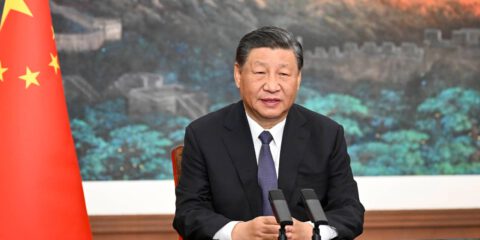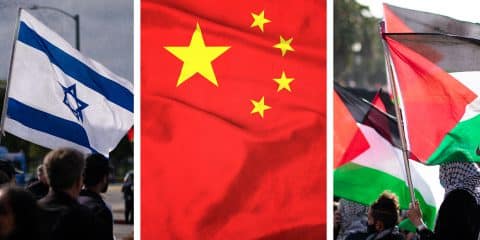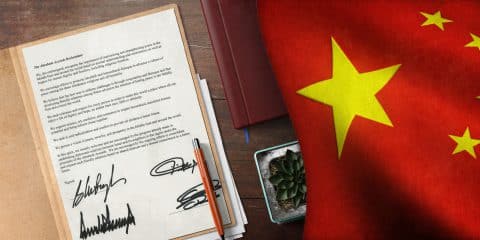It is not desirable to exacerbate the tensions with the US only due to the desire to increase sales of Israeli products to the Chinese market. Israel should also consider the West’s criticism of its policy toward Ukraine, its relations with the countries of the Indo-Pacific region, and that China and Iran signed a strategic agreement. It should also reevaluate its position toward Taiwan.
Prime Minister Benjamin Netanyahu plans to travel to China, a country with whom he greatly expanded bilateral relations for which he deserves credit. Kudos also for contributing to opening the large Chinese market for exports from Israel – and China is a powerhouse in the international arena.
Nevertheless, it is not certain that a trip to China is advisable at this time. First, it is seen by many as a defiance against US President Joe Biden, who has yet to send an invitation to Netanyahu to visit Washington – seven months after he became prime minister again. The Biden administration disagrees with the government in Israel, especially on the issues of settlements and legal reform.
It is undesirable to exacerbate tensions with the US on a non-existential issue for the State of Israel. Moreover, the negative attitude toward China is shared by both the Democratic and Republican parties in the US. Indeed, the policy toward China is one of the few issues on which the polarized American political system agrees. Israel has no reason to signal to our important ally that relations with China are the same as yesterday. A visit to China can wait.
The main issue in the developing international system is the rivalry between the US and China. It is hard to imagine that Israel will not stand to the right of the US in this struggle between the leader of the democratic world and a dictatorial power whose power seems to grow. Firm support for the US, the State of Israel’s most important ally, requires Israel to show some reservation toward China.
Taking a different position will bewilder the West. Noteworthy, the USA and European countries are moving toward reducing political and economic relations with China. There are efforts to minimize imports from China, especially in products where dependence on China becomes a national security problem. Measures are also being taken to reduce investments from China, and efforts are being made to prevent industrial and technological espionage. Israel is also going in this direction, mainly due to pressure from Washington.
Israel is currently under criticism for its policy toward Ukraine. Western countries expect Israel to support Ukraine more in its war against Russia. Even if Israel’s cautious policy toward Ukraine makes sense, it is not wise for Israel to be portrayed as deviating in its foreign policy from the Western democratic camp because the Israeli prime minister visits China.
Israel should also consider its relations with the countries of the Indo-Pacific region, for example, India, Japan, Australia, the Philippines, Vietnam, and Singapore. In all of them, the threat perception of China has increased following its aggressive policy in the region. Israel has extensive economic relations in the Asian area and important cooperation in the security area. Israel must be careful not to spoil relationships built with great effort because of the desire to increase sales of Israeli products to the Chinese market.
Today there are many questions about the strength of the Chinese economy. The economic growth rate after the epidemic is lower than expected. Furthermore, the Chinese economy suffers from structural problems such as heavy dependence on exports, high levels of state and Chinese corporate debt, large economic disparities between regions within China, ecological challenges, and an aging population. Of course, the biggest problem is large state involvement in the economy by owning many companies and extensive government regulation. All this does not bode well for the Chinese economy.
We must not forget that China has never been Israel’s friend. Its voting patterns in the UN and international institutions are hostile. In March 2021, China signed with Iran a strategic agreement pledging significant Chinese investments in Iran in exchange for oil supplies for 25 years. The agreement’s text was not published, but its very signing helped Iran ease the economic isolation imposed by the United States and its allies. Iran is a bitter enemy of Israel. In March, China mediated between Saudi Arabia and Iran, thereby strengthening the position of the Islamic Republic in the region.
China is also a permanent supporter of the Palestinians. In December, China voted in favor of the resolution at the UN General Assembly, calling on the International Court of Justice in The Hague to advise on the consequences of the Israeli occupation of the Palestinian territories. It also signed a “strategic partnership” agreement with the Palestinian Authority in June.
Following the problematic Chinese policy toward Israel, a reevaluation of the Israeli position toward Taiwan – a democratic and prosperous country – is called for. Perhaps it is time to send a signal to China that there is a price for the negative Chinese attitude toward Israel.
Israel has no choice but to support the US openly and strongly in the global struggle. That is required even if we sell less to China. Nevertheless, if Netanyahu still thinks the trip to China is important, he should add more capital cities in Asia to his trip.
סדרת הפרסומים “ניירות עמדה” מטעם המכון מתפרסמת הודות לנדיבותה של משפחת גרג רוסהנדלר
Photo: IMAGO / agefotostock








 - בניית אתרים
- בניית אתרים